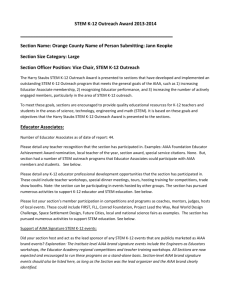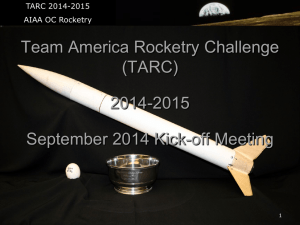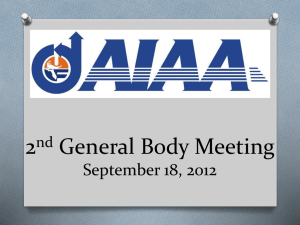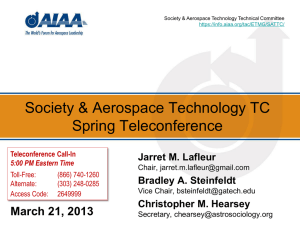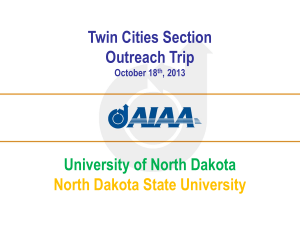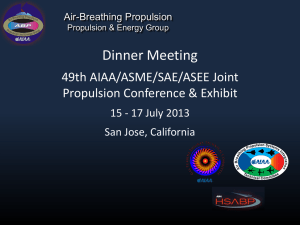2014 - AIAA OC Rocketry
advertisement
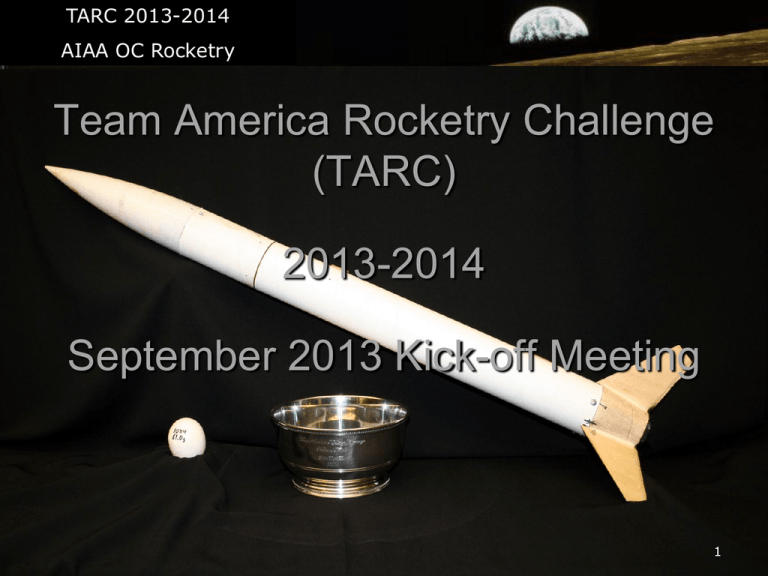
TARC 2013-2014 AIAA OC Rocketry Team America Rocketry Challenge (TARC) 2013-2014 September 2013 Kick-off Meeting 1 TARC 2013-2014 AIAA OC Rocketry Video on line at http://aiaaocrocketry.org/AIAAOCRocketryDocs/TARC2013/TARC_TeamAmericaRocketryChallenge.wmv 2 TARC 2013-2014 AIAA OC Rocketry Team America Rocketry Challenge “Team America Rocketry Challenge (TARC) provides 7th through 12th grade students a realistic experience in designing a flying aerospace vehicle that meets a specified set of mission and performance requirements. Students work together in teams the same way aerospace engineers do” 3 TARC 2013-2014 AIAA OC Rocketry What is TARC Team America Rocketry Challenge International Rocketry Contest Up to 1000 teams 7th through 12th graders Compete for scholarships and a trip to an Air Show in Europe Each year a challenge is issued • • • • Maximum weight Certain altitude Duration of flight Payload Your team designs, builds, and flies your design to meet the challenge Top 100 teams compete in finals Top 20 teams go on to compete in NASA Student Launch Initiative 4 TARC 2013-2014 AIAA OC Rocketry 2013 – 2014 Challenge Attain an altitude of exactly 825 ft Flight duration must be 48 – 50 seconds Must carry a payload of two raw hen’s eggs & return undamaged • Eggs can be flown in any orientation (vertical/horizontal) • Each egg must weigh 57 – 63 grams Rocket must stay tethered together Recovery of the rocket must be two parachutes of equal size Rocket may be any size but must weigh less than 650 Powered by “F” or lower motor(s) listed in approved motors Team members (not adults) do the work There are more rules – see the Team Handbook – the final authority 5 TARC 2013-2014 AIAA OC Rocketry 2013 – 2014 Scoring Similar to golf – the lower the score the better Target altitude is 825 ft • • Target time window is 48 to 50 seconds from liftoff until the rocket touches down (or can no longer be seen) • • • Each foot your altitude is different costs 1 point Accuracy is down to 1 foot measured by an onboard altimeter In the window costs 0 points Each second your time is different costs 4 points Time is measured to .01 seconds by observers on the ground Up to three Qualification Flights must be made between 9/2/2013 and 3/31/2014 – you MUST make two Final score is the average of the two best scores Scores must be received by at the offices of AIA by 3/31/2014 One point will be deducted for teams that submit at least one score before 3/2/2014 (that is good – lower scores are better) 6 TARC 2013-2014 AIAA OC Rocketry Previous TARC Years YEAR Top 100 AIAA Result 2008 750ft, 45 sec, 1500g, 2eggs, “G” motors, any recovery 22.20 22.28 3rd Alternate 2009 750ft, 45 sec, 1500g, 1 egg on side, “G” motors, any recovery 17.60 23.60 No Joy 2010 825 ft, 40-45 sec, 1000g, 1 egg, “F” motors, streamer 29.60 4.00 8th National -> SLI 2011 750ft, 40-45 sec, 1000g, 1 egg, “G” motors, 15” parachute 15.87 31.86 Too Busy with SLI 2012 800ft, 43-47 sec, 650g, 1egg, “F” motors, parachute 13.20 21.13 Too Busy with SLI 2013 750ft, 48-50 sec, 650g, 1 egg on 16.12 side, “F” motors, 15” parachute 4&9 No Joy at Nationals 7 TARC 2013-2014 AIAA OC Rocketry Skill: Teamwork 8 TARC 2013-2014 AIAA OC Rocketry Communications… I know that you believe you understand what you think I said, but I’m not sure you realize that what you heard is not what I meant 9 TARC 2013-2014 AIAA OC Rocketry Planning 10 TARC 2013-2014 AIAA OC Rocketry How are you going to do this? • Assemble a team • Read and understand the rules in the handbook • Read and understand the NAR Safety Rules • Meet often as a team to discuss and execute • Ask yourselves: What do we need to know? • Make a plan including timetable and budget • Research the topics from what we need to know • Design your rocket using a CAD program • Simulate your rocket’s flight & select your approved motor • Fine tune the design and the motor selection • Order parts and motors • Build your rocket • Test Fly your rocket and compare against simulation • Modify your design and test fly again (iterative) • Declare qualification flights and fly your rocket 11 TARC 2013-2014 AIAA OC Rocketry NAR Safety Code Highlights • Use only lightweight, non metal parts for the nose, body, and fins • Use only certified and approved commercially made motors • Use an electrical launch system with safety interlock for the ignition switch •Use a launch rod, tower or rail pointed to within 30 degrees of vertical • Don’t launch at targets, into clouds, or near airplanes • Assure adequate space (“F” motors require a minimum of 1000 ft across launch site • You must use a recovery system (parachute(s) or streamer • Read the full Model Rocket Safety Code in the Handbook 12 TARC 2013-2014 AIAA OC Rocketry Assemble a team • Teams must be 3 – 10 members • All members must be in 7th through 12th grades •You need a lot of different skills – not just “rocket scientists” • Members that like to lead and manage a team • Technical members to help design • Mechanically oriented members to help build • Members familiar with the computer • Members that like to track budgets and fundraise • One team member must be the Program Manager •Each team member must make a significant contribution to the design, building and/or launching • Team members can be added or dropped until the first qualification flight 13 TARC 2013-2014 AIAA OC Rocketry Early Team Tasks • Identify a project manager to be responsible for the team • Each team member should read and understand the contest and safety rules in the Handbook • Identify what you need to know and needed areas of expertise • Establish a schedule with dates and stick to it • Estimate your costs and your fundraising needs and methods 14 TARC 2013-2014 AIAA OC Rocketry Schedule and Budget •Schedule: Use Microsoft Office “Excel” or Open Office “Calc” to show tasks and time – then stick to your schedule! Budget: Use the same tool to get an estimate of what you will spend on this project – then you know how much money you will need to raise 15 TARC 2013-2014 AIAA OC Rocketry Research areas of expertise • You might want to have each member research a different area and report to the team to share their knowledge • Areas of expertise might include • Payload (protect the eggs) • Recovery (deliver eggs from altitude) • Airframe design, fins, nose cone • Rocksim CAD Design • Motors and igniters • Effects of weather on the rocket • Collect and analyze launch data • Construction and finish • Budget and fundraising 16 TARC 2013-2014 AIAA OC Rocketry Technology leads share research 17 TARC 2013-2014 AIAA OC Rocketry Discuss design concepts Use the research from team technology leads to begin your design You might want one to start out with one design, or want to test concepts with several designs You might want one joint design, or one from each of several team members 18 TARC 2013-2014 AIAA OC Rocketry Evaluate potential designs Make use of your technology experts • • • • • • • • Long or short body Shape of nose cone Shape of fins Placement of egg payload Protection of egg payload Shape of parachute Black Powder or APCP motor Materials to use • The list goes on and on • The team needs to make educated decisions 19 TARC 2013-2014 AIAA OC Rocketry Determine how to protect your payload 20 TARC 2013-2014 AIAA OC Rocketry Test your Payload 21 TARC 2013-2014 AIAA OC Rocketry Design and Simulate with Rocksim 22 TARC 2013-2014 AIAA OC Rocketry RockSim – Design & Motor Selection 23 TARC 2013-2014 AIAA OC Rocketry RockSim - Simulation 24 TARC 2013-2014 AIAA OC Rocketry Order and receive parts and motors 25 TARC 2013-2014 AIAA OC Rocketry Build your design(s) Construction is as important as design for consistency of flights 26 TARC 2013-2014 AIAA OC Rocketry Where can you launch? • Very restrictive - NOT in your back yard, park, or school yard • State of California requires the landowners permission, the local fire authority’s permission, and often a permit ($300 - $1,000 per day) • Rockets above 500g and with larger motors have more restrictions in California • Best to launch at organized launches (Distances are from the city of Orange) • R.O.C. in Lucerne Dry Lake past Apple Valley (about 100 miles) • D.A.R.T. at Fiesta Island near San Diego (about 90 miles) • S.C.R.A. at Santa Fe Dam Recreation Area (about 35 miles) – limit is 500g rockets and “C” motors in spring • There are more sites even further away – we will use those if needed 27 TARC 2013-2014 AIAA OC Rocketry Test and Tune Your Design 28 TARC 2013-2014 AIAA OC Rocketry The Qualification Flight The Qualification Flights are your ticket to the finals You can make up to 3, your final score is the average of the best 2 There is no single qualification event – you can make a qualification flight at any time there is an independent senior NAR member present and an adult to observe at a launch You declare your Qualification Flight BEFORE the launch The NAR observer will inspect your rocket before flight • • For safety – should it be stable and is it built well? For rule compliance – two eggs, motor size, correct altimeter, correct parachutes 29 TARC 2013-2014 AIAA OC Rocketry The Qualification Flight Cont’d The NAR observer will watch and time your flight The NAR observer will inspect your rocket after flight • • • The observer will record your altitude and times The observer will inspect your eggs for damage The observer will inspect your rocket for serious damage – it must be able to fly again Send your scores in to TARC/AIA to be received by 11:59PM EST on 3/31/2014 30 TARC 2013-2014 AIAA OC Rocketry Qualify! 31 TARC 2013-2014 AIAA OC Rocketry Video on line at http://aiaaocrocketry.org/AIAAOCRocketryDocs/TARC2013/ASAT_TARC2010-W-Beeps.wmv 32 TARC 2013-2014 AIAA OC Rocketry Attend Finals near Washington D.C. 33 TARC 2013-2014 AIAA OC Rocketry Top 20 teams invited to SLI NASA Student Launch Initiative program by invitation only Learning opportunity working with NASA including: Design, construction, scheduling, purchasing, finance, logistics, press, educational engagement, web site development, technical documentation, scientific payload design, testing for a reusable lanch vehiclescientific payload Organized similar to NASA project life cycle Write Proposal, Preliminary, Critical, and Flight Readiness Reviews and present via WebEx to engineers at Marshall Space Flight Center, Tour Marshall Space Flight Center, Exhibit at Rocket Fair, Launch rocket in Huntsville, Alabama 34 TARC 2013-2014 AIAA OC Rocketry How can AIAA OC Section help? Teams must be attached to a non-profit organization with a youth program such as AIAA, a school, scout troop, 4H Each organization can have up to 5 teams of 3 to 10 members each If your school, 4H, scout troop or other youth program will not let you form a team attached to them, AIAA can have 5 teams or help find other professional organizations to help For any team • • • • • We will provide mentoring as needed We will provide a place to meet with PCs with Rocksim We will provide construction materials (glue, fin jigs etc.) We will have many launch outings to test and fine-tune We will help you put together a field box with essential tools and support materials 35 TARC 2013-2014 AIAA OC Rocketry Budget Teams are responsible for their own expenses • Materials to build one rocket: $25 - $50 (2 or more per design) • Motors to launch: $6 - $19 each (10 – 30 launches total) Small “E” Black Powder Single Use: $6.00 Estes or Aerotech APCP “E” Single Use: $15 - $18 Estes or Aerotech APCP “F” Single Use: $18 Aerotech or Cesaroni APCP “E” Reloads: $9 - $15 + One Casing Aerotech or Cesaroni APCP “F” Reloads: $15 - $19 + One Casing • Transportation to the launches (gas and vehicle) • WHEN you make the finals Air Fare to Washington DC - $400/person Hotel ($89/room/night – share rooms) Meals ($5-$10/meal) Fundraising Sales: Garage, Sees Candy, Mary Kaye Cosmetics Corporate Sponsors: Industry, Aerospace, Local Businesses Do chores, beg parents to help (it’s your responsibility to raise money, not theirs) 36 TARC 2013-2014 AIAA OC Rocketry 2013 Schedule • 9/2 – 12/31: Sign up • September – AIAA OC Section TARC 2013 kick-off • Sept – Dec: Design, build, and test – the earlier the better 2014 • • • • • • Jan – 3/31: Refine design and continue to test 3/2 – Should have completed first qualification flight 3/31 – Must have completed all qualification flights 3/31 – Qualification flight forms RECEIVED at AIA 4/4 – top 100 teams announced 5/10 – Final Fly-offs near Washington DC More Information http://rocketcontest.org http://AIAAOCRocketry.org http://groups.yahoo.com/group/NARTARC http://www.nar.org 37 TARC 2013-2014 AIAA OC Rocketry How to proceed from here Team completes the “TARC 2014 Application Packet” Each team member completes the “Parent/Guardian Consent & Release Form” 38 TARC 2013-2014 AIAA OC Rocketry A Few General Tips • New teams might want to build and fly 2.6” rocket kit as a group, or have each member build and fly a smaller kit to get some experience before designing. • Start as soon as possible with your design – time passes very fast and school must come first. • Select your motor early from RockSim and validate with test flights • Buy all the motors you need at one time with the same lot number • There can be a long lead time on motors starting December as 1000 teams buy 20 similar motors each from just a few manufacturers • Prepare for bad weather and cancelled launches January through March Our Favorite Launch Site – Lucerne Dry Lake – isn’t always Dry 39 TARC 2013-2014 AIAA OC Rocketry Thank you Questions? 40
